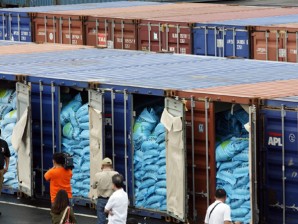MANILA, Philippines—The Goliath of rice smuggling, “David Tan,” is costing the country at least P7 billion in foregone duties every year, and massive opportunity losses for Filipino farmers whose palay production are being shunned by rice millers who prefer to buy smuggled rice already packed in cavans, or 50-kilo sacks.
Tan has emerged as the point man of rice smugglers in the country after the smuggling of the staple was reportedly consolidated under a single operator during the Aquino administration, according to a former customs official.
In an interview, Rosendo So, president of Samahang Industriya ng Agrikultura (Sinag), gave an idea of the impact of Tan’s alleged smuggling activities on the government’s revenues and the future of rice farming in the country.
According to So, if you looked at the official records of the rice-exporting countries Vietnam and Thailand, the Philippines imported a total of 1.5 million MT, or 30 million cavans, of rice in 2012.
But data from the Bureau of Agriculture Statistics showed that only 692,220.74 metric tons, or 13,844,414 bags, came in through official channels during the same period.
This means that 16,155,585 bags were either sneaked in or were misdeclared as construction materials under the noses of crooked customs officials, said So, a former House party-list member of the Abono group.
“This data clearly showed that more than five of every 10 bags of imported rice sold in 2012 were smuggled. Each bag should have been levied 50 percent in duty, or P451.50 each, if this was shipped in through official channels. That’s P7.29 billion in foregone revenues for the government in 2012 alone,” said So in a phone interview.
Sinag is composed of 30 groups of rice, corn and vegetable farmers and traders, pork, livestock and poultry producers, aqua-venture groups, and fertilizer and pesticide suppliers from Luzon, the Visayas and Mindanao.
According to So, it was no surprise that Tan could afford to distribute at least P2 billion in payoffs to officials of the Bureau of Customs to facilitate his smuggling operations and give P1 billion in advances to dummy corporations just to dominate the National Food Authority’s (NFA) bidding of rice import quota allocations, as revealed in a series of Senate hearings a year ago.
But more than the impact on government finances, So said Tan’s smuggling operations had a more pervasive effect on the income of Filipino rice farmers because the 50-percent duty on rice served as the industry’s main defense against imports.
Since Tan’s smuggled rice costs only P903 per bag (Vietnam and Thailand lavish sizable subsidies on their rice farmers), So said Tan had a “very wide margin” to sell his smuggled rice, considering that local rice sold for an average of P1,500 per bag.
“Tan can easily undercut the farmers by selling his hot rice at P50 to P100 off the local price, which is still a big margin for rice traders. This is the reason why some rice millers, instead of buying palay, find it more profitable to buy rice from Tan as they do not have to go through the milling and packaging process. No wonder some rice millers have become mere rice traders, their milling houses converted to warehouses,” So said.
Farmers sell palay at P18 to P21 per kilo against the rice price of P28.80 per kg to P33.60 per kg.
Last February, a joint Senate committee report recommended a wider investigation into Tan and other rice-smuggling operators in the country.
But despite the leads that the Senate provided, the National Bureau of Investigation claimed to have hit a blank wall in its search for Tan.
RELATED STORIES:
P6-B payoff in rice smuggling revealed
DOJ, NBI hit blank wall on ‘David Tan’–De Lima
Why didn’t NBI, DOJ investigate ‘David Tan’?
